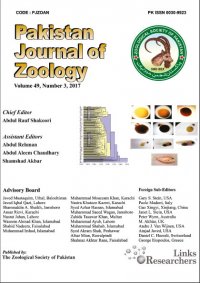ABSTRACT
Environmental enrichment plays a very important role in improving the behavioral selectivity, health and welfare of captive giant pandas. The increase in specific behaviors and the reduction of abnormal behaviors are considered to be important indicators of the physical health of giant pandas, and the ideal result of environmental enrichment is to make captive giant pandas appear close to nature. To understand the effect of Pinus koraiensis bark substrate on the behavioural responses of captive giant pandas, we selected 6 adult female giant pandas and 6 juvenile giant pandas from Chengdu Giant Panda Breeding Research Base, and performed a one-month behavioral study during the non-mating season, focusing on observing the performances of stereotypes and behavioral diversity. The results showed that both adult and juvenile giant pandas preferred to feed in places where substrate was placed; additionally, juvenile giant pandas living in an outdoor playground that was covered with substrate were more active than those without substrate (p<0.01); moreover, the social and the play behaviors were significantly more frequent in the juvenile giant pandas with substrate (p<0.01). The P. koraiensis bark substrate significantly reduced the frequencies of stereotypic behaviors of adult captive giant pandas (p<0.01) and increased the expression of behavioral diversity among captive giant pandas. It is concluded that the use of this environmental enrichment program of laying P. koraiensis bark substrate in an outdoor playground could increase the behavioral adaptability of captive giant pandas, facilitate the expression of behavioral diversity, and improve the welfare of captive giant pandas.
To share on other social networks, click on any
share button. What are these?










